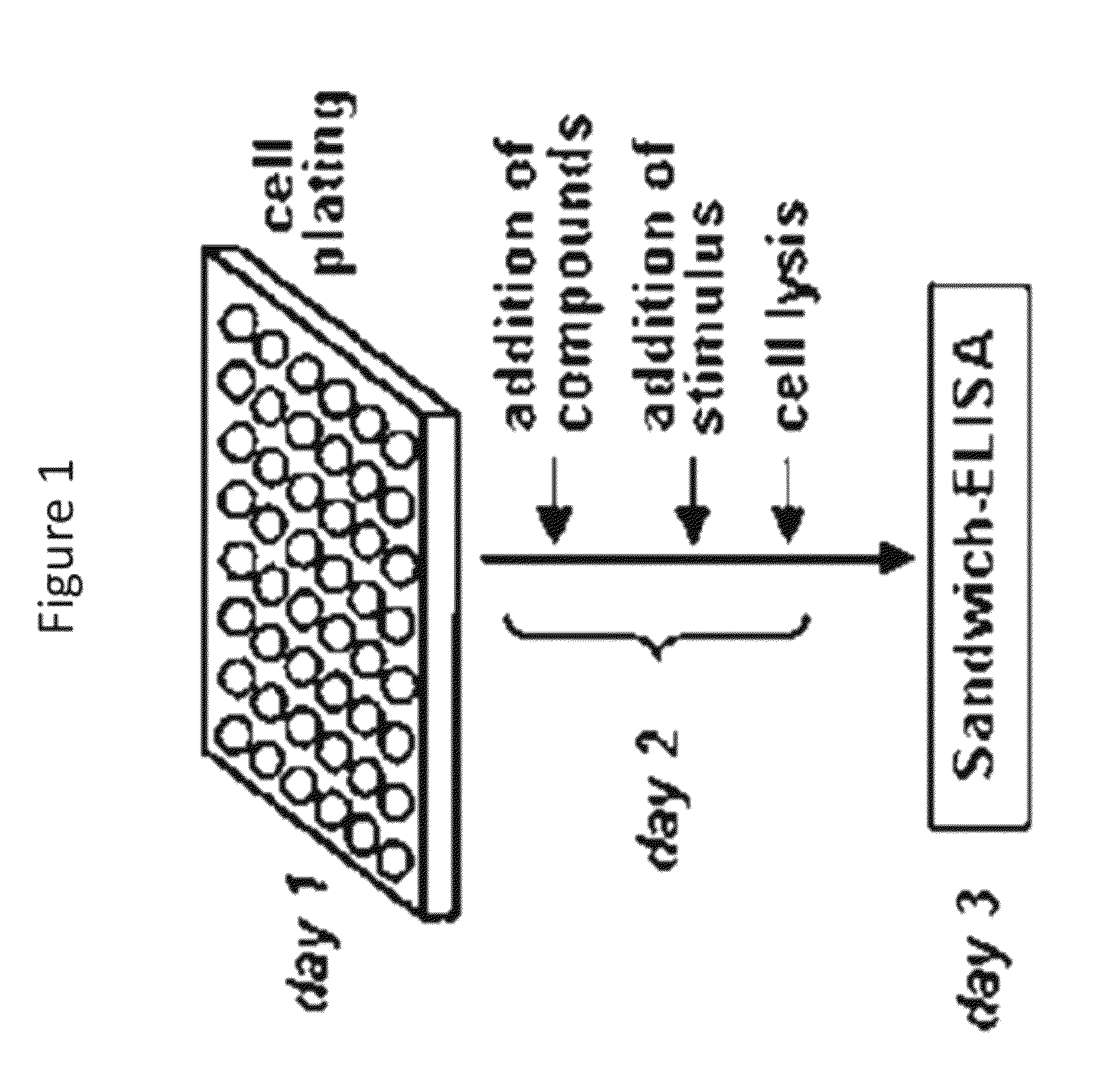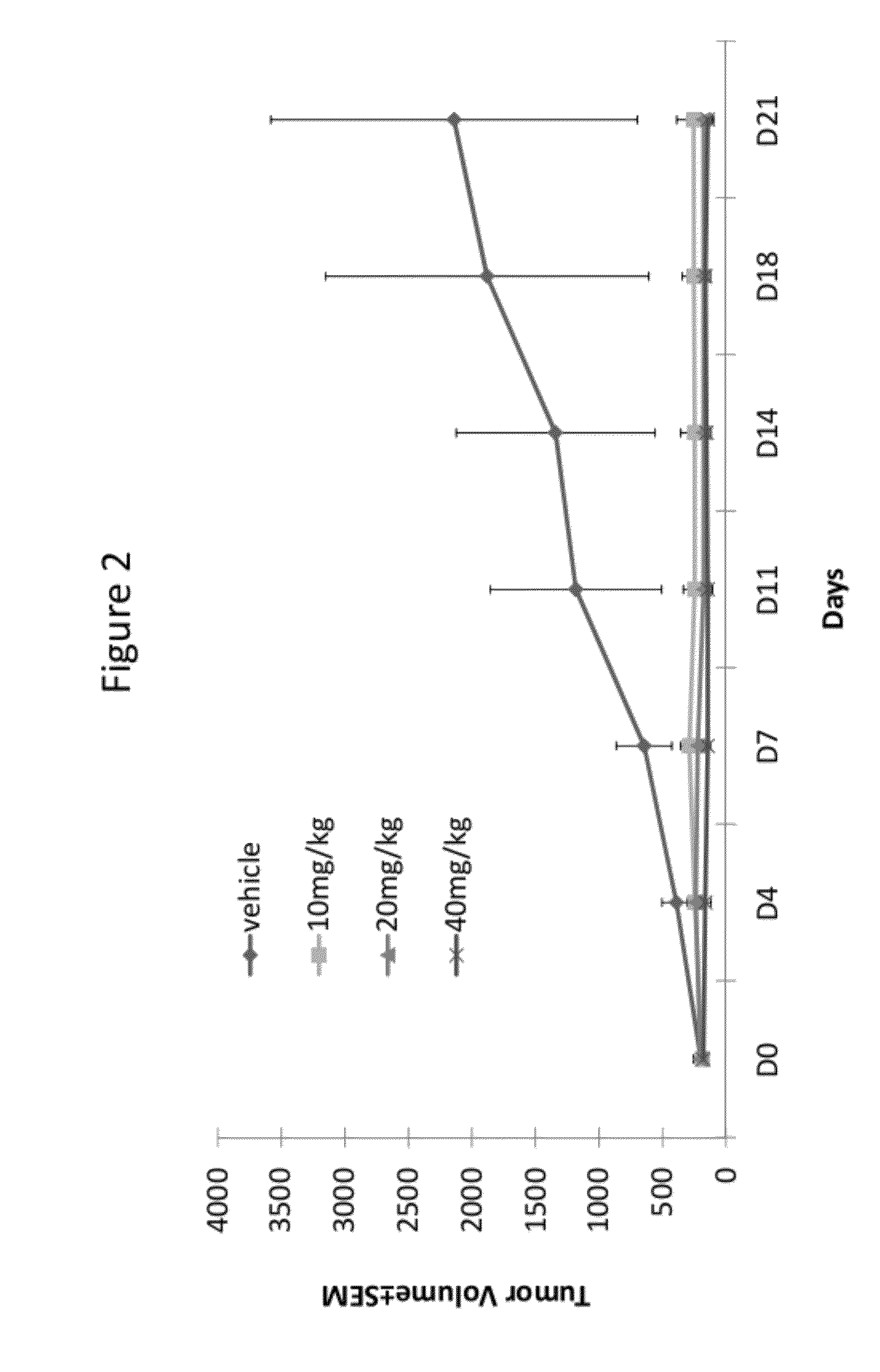Substituted quinoline compounds and methods of use
a technology of quinoline compounds and substituted quinoline, which is applied in the direction of phosphorous compound active ingredients, drug compositions, cardiovascular disorders, etc., and can solve the problem of reducing the chance of resistance developmen
- Summary
- Abstract
- Description
- Claims
- Application Information
AI Technical Summary
Benefits of technology
Problems solved by technology
Method used
Image
Examples
example 1
N-(3-fluoro-4-((7-(2-hydroxy-2-methylpropoxy)quinolin-4-yl)oxy)phenyl)-1,5-dimethyl-3-oxo-2-phenyl-2,3-dihydro-1H-pyrazole-4-carboxamide
[0138]
Step 1) 5-(((3-(benzyloxy)phenyl)amino)methylene)-2,2-dimethyl-1,3-dioxane-4,6-dione
[0139]To a solution of 3-(Benzyloxy)benzenamine (970 g, 4.9 mol, Wuhan Xinghuayuan Tech. Co. Ltd.) and 2,2-dimethyl-1,3-dioxane-4,6-dione (842.3 g, 5.8 mol) in anhydrous EtOH (970 mL) was added triethoxymethane (865.7 g, 5.8 mol). The suspension was heated to reflux for 1 hour. The reaction mixture was then cooled to room temperature, and continued to stir for additional 2 hours. The suspension was filtered, and the solid was stirred in anhydrous EtOH (970 mL) for 2 hours, collected by filtration. The solid was dried in vacuo at 45° C. to give the title compound as a pale yellow solid (1.7 kg, 96.5%).
[0140]MS (ESI, neg. ion) m / z: 352.3 [M−1];
[0141]1H NMR (400 MHz, DMSO-d6): δ 1.71 (s, 6H), 5.16 (s, 2H), 6.91 (dd, J=2.0 Hz, J=8.0 Hz, 1H), 7.13 (dd, J=1.6 Hz, J=8...
example 2
(R)—N-(3-fluoro-4-((7-(2-hydroxypropoxy)quinolin-4-yl)oxy)phenyl)-1,5-dimethyl-3-oxo-2-phenyl-2,3-dihydro-1H-pyrazole-4-carboxamide
[0163]
Step 1) 4-(4-amino-2-fluorophenoxy)quinolin-7-ol
[0164]To a mixture of 7-(benzyloxy)-4-(2-fluoro-4-nitrophenoxy)quinoline (16.38 g, 42 mmol) and HCOONH4 (26.46 g, 420 mmol) in a mixture solution of EtOH / H2O (84 mL, v / v=4:1) was added a catalytic amount of Pd / C (0.50 g, 5% amount, 53%˜55% water content, w / w). The reaction was stirred at 30° C. for 24 hours, and was monitored by LC-MS. After the complete consumption of 7-(benzyloxy)-4-(2-fluoro-4-nitrophenoxy)quinoline, 6 M HCl (80 mL) was added to the reaction mixture until the solid was dissolved. The resulted solution was filtered. Saturated aqueous NaHCO3 solution (210 mL) was added to the filtrate to adjust the final pH to 6.0˜6.5 followed by the addition of a mixture of water (20 mL) and CH2Cl2 (50 mL). The resulted mixture was stirred at room temperature for 4 hours. The solid was collected by ...
example 3
(S)—N-(3-fluoro-4-((7-(2-hydroxypropoxy)quinolin-4-yl)oxy)phenyl)-1,5-dimethyl-3-oxo-2-phenyl-2,3-dihydro-1H-pyrazole-4-carboxamide
[0173]
[0174]The title compound was prepared according to the procedure described in Example 2 by using N-(3-fluoro-4-((7-hydroxyquinolin-4-yl)oxy)phenyl)-1,5-dimethyl-3-oxo-2-phenyl-2,3-dihydro-1H-pyrazole-4-carboxamide (1.00 g, 2.07 mmol), (S)-2-methyloxirane (1.44 mL, 20.70 mmol) and Cs2CO3 (1.35 g, 4.14 mmol) in 10 mL DMF. The title compound was obtained as a white solid (663 mg, 55%).
[0175]MS (ESI, pos. ion) m / z: 543.2 [M+1]; LC-MS Rt: 2.935 min;
[0176]1H NMR (400 MHz, CDCl3): δ 1.30-1.40 (d, J=6.3 Hz, 3H), 2.79 (s, 3H), 3.36 (s, 3H), 3.96-4.02 (dd, J1=7.5 Hz, J2=9.5 Hz, 1H), 4.08-4.14 (dd, J1=3.3 Hz, J2=9.5 Hz, 1H), 4.25-4.34 (m, 1H), 6.40-6.50 (dd, J1=1.0 Hz, J2=5.2 Hz, 1H), 7.13-7.19 (t, J=8.6 Hz, 1H), 7.22-7.26 (dd, J1=2.5 Hz, J2=9.2 Hz, 1H), 7.28-7.33 (m, 1H), 7.34-7.37 (m, 2H), 7.39-7.41 (d, J=2.5 Hz, 1H), 7.45-7.50 (m, 1H), 7.53-7.59 (m, 2H), 7...
PUM
| Property | Measurement | Unit |
|---|---|---|
| flow rate | aaaaa | aaaaa |
| temperature | aaaaa | aaaaa |
| temperature | aaaaa | aaaaa |
Abstract
Description
Claims
Application Information
 Login to View More
Login to View More - R&D Engineer
- R&D Manager
- IP Professional
- Industry Leading Data Capabilities
- Powerful AI technology
- Patent DNA Extraction
Browse by: Latest US Patents, China's latest patents, Technical Efficacy Thesaurus, Application Domain, Technology Topic, Popular Technical Reports.
© 2024 PatSnap. All rights reserved.Legal|Privacy policy|Modern Slavery Act Transparency Statement|Sitemap|About US| Contact US: help@patsnap.com










